by Harutyun Tsatryan
When it comes to the dissemination of fake news and fact-checking related skills, younger audiences are different from older groups not just in what they do before consuming the news, but in their core attitudes in terms of what they want from the news. We tried to find some young voices from different parts of Germany in the framework of our 5-day study trip to Berlin. Our goal was quite clear – understand what young people actually want from the mainstream media and what kind of news they consume. The interviews with German media experts working for different media companies and think-tanks helped us greatly to have a clearer picture of who may be responsible for spreading fake news in the country.
We are going to share these results in a two-part feature story, which will illustrate what the situation of media consumption in Germany is when it comes to fake news and the channels through which they are spread, what the purpose of this kind of activity is, how young people react and what fact-checking skills they have. Unfortunately, during our study visit we did not manage to reach out to government agencies to learn some official opinion on fake news in the country.
PART 1
Studying media literacy in schools is highly recommended by young people
What media channels are used by young people in Germany, and does the audience have some medium preferences? We asked these questions to the young Germans during our interviews with them.
Fact-checking and news verification are topics that have recently become an inseparable part of public and professional discussions. Active spread of fake news and manipulations by political influencers and public figures has made leading media organizations be much more skeptical towards the information they get even from official channels and sources.
*****
It was a sunny morning of October, when our plane landed at Berlin Tegel airport. A group of Armenian journalists had a concrete mission in the capital of Germany – to exchange practices with German colleagues and experts during a series of meetings. I used the very first day to meet some locals, mostly young people and experts, with whom I had been in touch in recent years within different European projects.
My first interviewee was Christian Genenger, whom I had been knowing since May 2018. Christian, 29, lives in Kempen, a town in the district of Viersen, in North Rhine-Westphalia. Christian studies agriculture and mostly prefers to read online news publications related to his profession. However, at least once a day he tries to catch the evening news programme of the German public broadcaster ARD (Arbeitsgemeinschaft der öffentlich-rechtlichen Rundfunkanstalten der Bundesrepublik Deutschland).
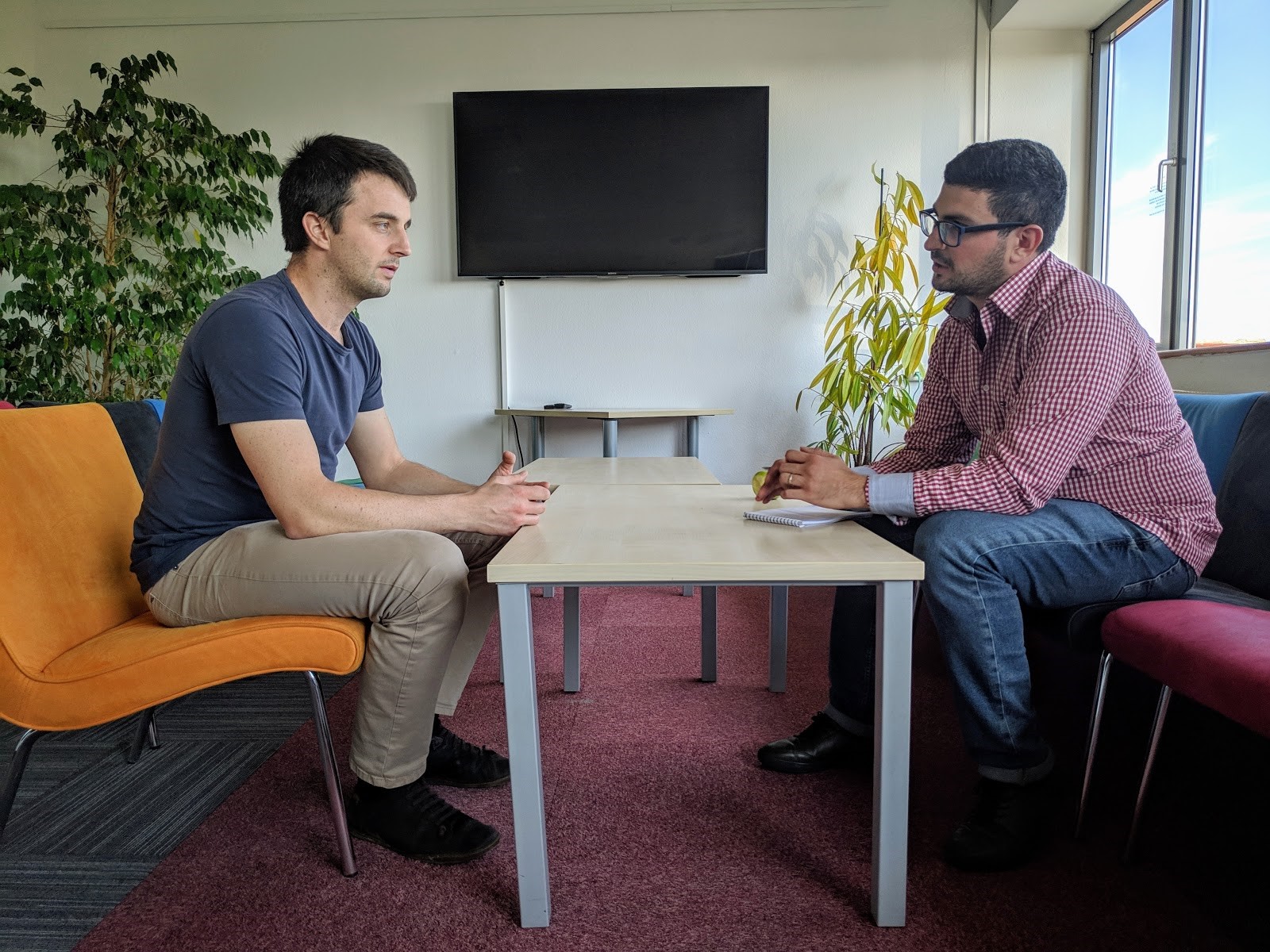
Christian and Harutyun are discussing the news programme of ARD.
“I am not a big fan of television, but I have got used to watching the news programme of ARD. I think they always provide correct and checked news. I am not questioning the news, which they broadcast,” says Christian in the beginning of our interview. Speaking about the media channels he daily uses to get news and analyses, Christian pointed out online media, which is very diverse in Germany. The student has Facebook and WhatsApp accounts, but he tries not to share any kind of news on those social media platforms. When it comes to Twitter, Christian is not an active user of it.
Anna Paul, 21, currently lives in Budapest because of her university studies, but originally she is from Bonn, a city on the banks of the Rhine in the German state of North Rhine-Westphalia. Anna uses Twitter, which helps her get news faster, and some interactive mobile apps of German leading online news publications.

Anna explains how active she is on Twitter and what news preferences she has.
“To be honest, I like to listen to political podcasts as well. They provide interesting opinions to the audience. When it comes to the language of the news, I have no special preferences. I can easily read in English and in German. Of course, as a German, I read, listen to and watch mostly in German, but I don’t have a TV set at my place, so when surfing on the Internet I can find an interesting piece in English and read it without thinking they can manipulate me with the content,” says Anna. Despite the lack of media literacy education at the high school and university level, she knows how to check the sources mainly using Google Advanced Search when something seems very strange to her.
During our 5-day visit I also talked to another young German, Felix Kappert, 22, from Munich, the capital of Bavaria, who also looks for news mostly on Twitter pages and in online publications. Felix is an active user of mobile apps of the leading news publications. As a political science student, Felix is interested in politics and mostly consumes news on the German and international politics. He gets news in German language and has developed skills to search through Google when something seems unreliable or faked to him.

Felix knows a lot about politics and tries to use only reliable sources.
“It is not a skill that I have trained at school or university. Sometimes I question some quotes or statistics and I know where to find the original sources or check the news in general. I have trust towards the news provided by the German government agencies, but if I see something strange, I can easily find a way to check that,” says Felix during our short talk.
Justus Kathmann is the youngest German with whom I made an interview during the study trip. He is a 19-year-old student from Lastrup, a municipality in the district of Cloppenburg, in Lower Saxony. Justus in not a fan of television, but he prefers to watch news on TV. Sometimes he shares news on social media, but it is not his main interest when he is online.
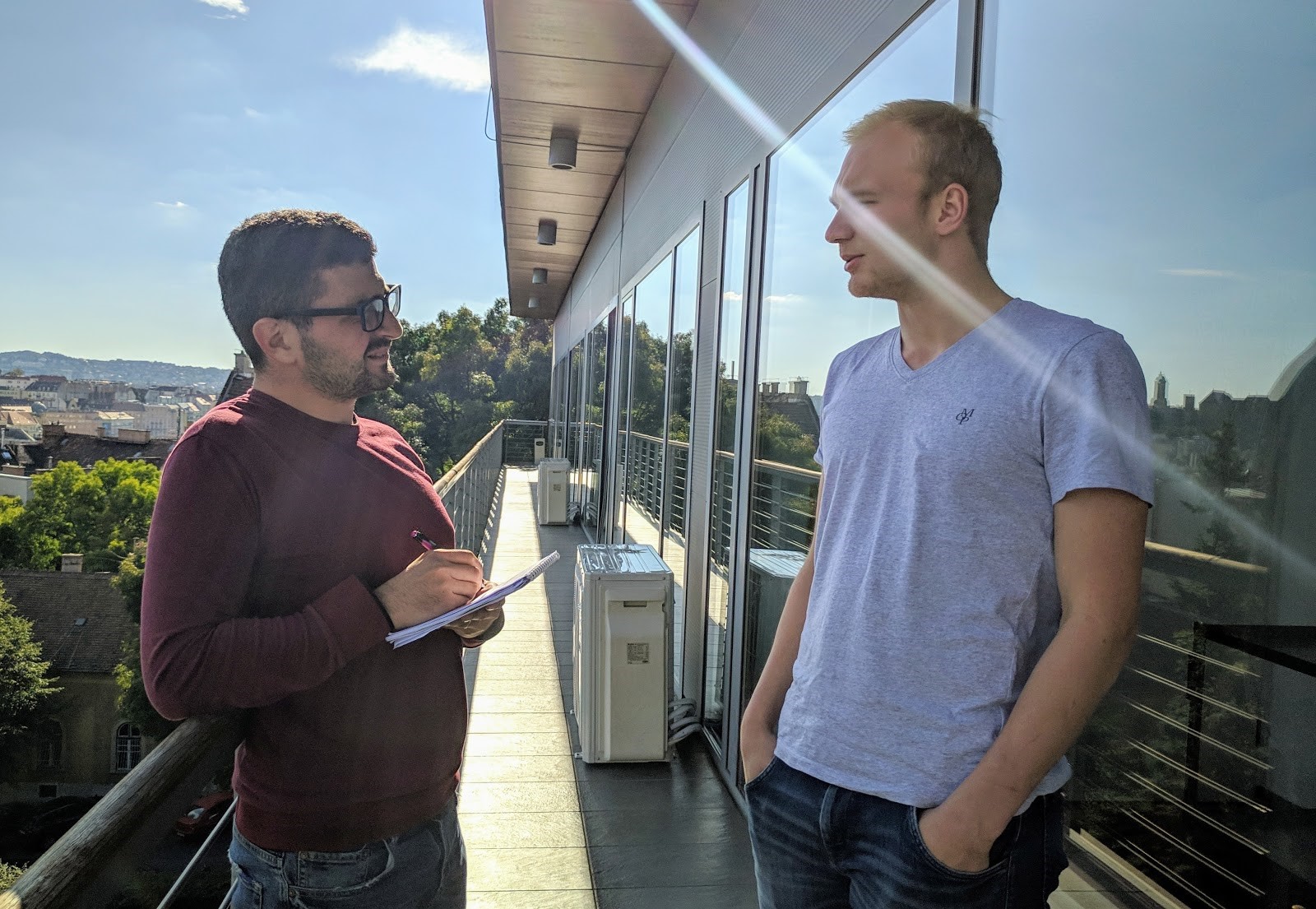
Justus explains why he reads and watches TV only in German when it comes to news.
“At German schools we do not have media literacy classes, and this is the reason I have a lack of fact-checking skills, but we have been taught how to use the Internet safely. It would be good to have fact-checking skills though. Frankly speaking, I fully trust the public broadcaster of Germany [ARD] and always get news in German, as it is much easier for me to understand the content,” Justus says.
Olivia Sigmund, 22, also has trust towards the media channels she uses to stay informed. Olivia lives in Rottenburg am Neckar, which is a town in the administrative district of Tübingen in Baden-Württemberg. Olivia studies water management at the local university, but when it comes to news preferences, she reads mostly pieces related to politics. During our interview Olivia remembers that in high school they have talked about reliable media sources, but there has been no concrete programme on media literacy, which is very important for young people nowadays. Olivia does not like social networks and avoids having social media accounts because she does not trust the news spread there. Even though she has a Facebook account, she tries to spend less time there.

Olivia is not an active social media user, but she has had a school programme on reliable sources and Internet safety.
“I am not interested in sharing news on my wall. I use the account to keep in touch with some friends that also have Facebook accounts. I would say I am not an active user of social media,” tells Olivia when asked about getting news from social media and time spent there.
Daniela Ordowski, 26, a youth worker from a German city Offenbach am Main located in Hesse, near Frankfurt, unlike Olivia, is an active user of social media. She always shares stories with friends, and one can easily find some posts from different publications on her Facebook wall. She studied political science and got used to consuming news related to politics and culture. Recently, she is fully concentrated on the climate change topic and launched “How about YOU(th)” podcast programme. When it comes to the language of media, Dani uses her native language, as she knows which media is reliable in Germany.

Dani is very active on social media. She has launched a podcast early this year and knows how media works.
“When I am reading an article on my smartphone screen, I always ask several questions, when the content seems strange or unbelievable to me. I don’t go into the depth of each news, but I know what sources to use not to be manipulated by the media,” says Dani. She is an active young person who promotes youth work, non-formal education and digital participation of young people in Germany, and the Internet gives a lot of chances to her and the organization she works with to reach more people.
In my talks with young Germans I did not hear many complaints about fake news or media manipulation, or at least my interviewees seemed to be well-prepared on news consumption or media channels to be used. However, it was a different picture when I spoke with experts from German media organizations and think-tanks.
PART 2
Media experts are worried: concrete groups are interested in spreading fake news in Germany
Is there any possibility that modern societies can face fake news and easily win the battle against those who are interested in spreading disinformation? How governments can solve the issue regarding fake news and the groups, which mainly try to destabilize the situation through disinformation? Of course, there is no direct and true answer to the above-mentioned questions. Each society needs some good skills and deeper knowledge to fight fake news, which is a very common thing everywhere in the world. Germany is not an exception. There are cases, when media organizations cannot rely on their sources and need to spend some time to verify the information.
During my study trip to Germany I met several German media experts, practitioners that helped me understand the current situation in this big European family member country. A colleague, whom I had met a year before in Armenia, Clemens Schöll is a highly respected professional in Germany. For many years he has been engaged with the exchange and networking of journalists worldwide with a focus on Central, Eastern and South-Eastern Europe. According to him, people still go for printed news in Germany.
“Old people are the ones who buy newspapers. Younger generation is not interested in buying newspapers. They don’t read news. TV channels are spending a lot of money on sports news, but why doesn’t that work for the audience? I know the answer: many football clubs have already established their own TV channels. The ARD, German Public TV, spends much money on sports news nowadays than before. Why do they do this, what audience do they want to attract?” a rhetorical question is raised by the expert.
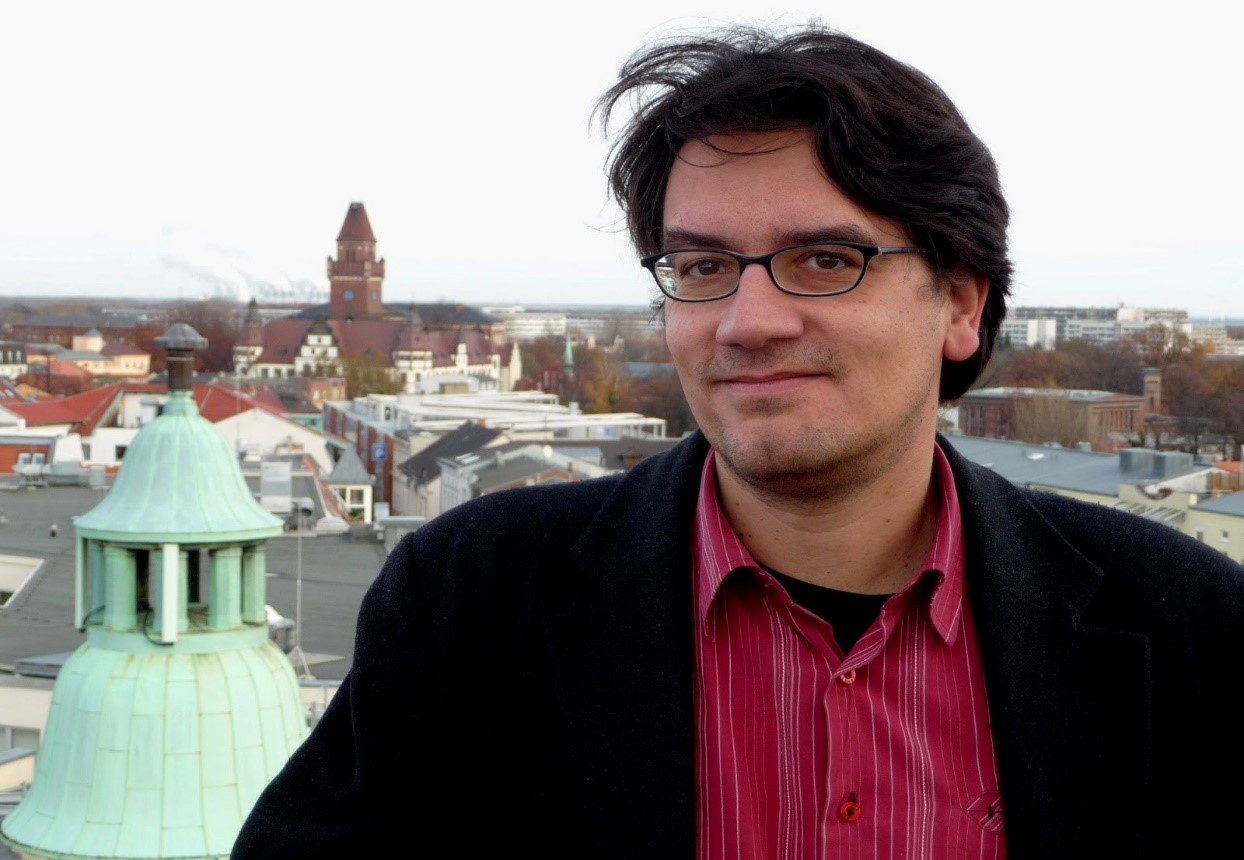
Clemens Schöll
The colleague categorizes the sources in Germany that try to manipulate public opinion through spreading some fake news or providing partially true information. According to Clemens Schöll, German far right party AfD (Alternative for Germany) is one of those sources.
“They know how to play with public opinion and try to reach more people through social media, but the AfD people are not the only ones spreading fake news in Germany. We still have low quality websites, which disseminate fake and not verified news. You should be attentive towards the content coming from the Russian media organizations such as RT, RUPTLY or Sputnik. They can easily make people believe in things, which do not have any connection to reality,” said Clemens Schöll while we were talking about the news channels mostly interested in spreading disinformation.
Of course, there are topics that always bring public discussions and debates. Clemens states that in Germany social welfare is one of these topics. “Sometimes the officials are not ready to speak about the real causes and consequences, and they try to manipulate saying partially true things.” The German expert is sure that it makes people have less trust on them now and in the future.
“Climate change is the next big topic. There are groups, which spread lots of fake news on climate change and what it is in reality. The audience should have some developed skills to search for truth, but this is not a new rule of our life,” Clemens concludes. In the end he adds that there are some groups on Facebook, which try to fight fake news and fake pages.
One of those groups is located in the newsroom of the ARD. Silvia Stöber works for the ARD, which has created a group of two fact-checking specialists since 2017 ahead of the parliamentary elections. As a freelance journalist, Silvia has specialized for more than five years in the South Caucasus. She writes regularly for various media such as the Neue Zürcher Zeitung, the Tagesspiegel, Zeit Online, tagesschau.de (a fact-checking platform), etc.
“The name of our group at the ARD is FactFinder. Every day we face fake news and come with counter publications. At the German public TV we spend a lot of time on monitoring the media, the speakers’ speeches and public figures’ posts on social media. Sometimes our friends send us some publications and ask for verification. We do respect what we do, but fortunately we are not the only ones in Germany. There is also CORRECTIV [German non-profit newsroom investigating injustice and abuses of power],” explains Silvia.
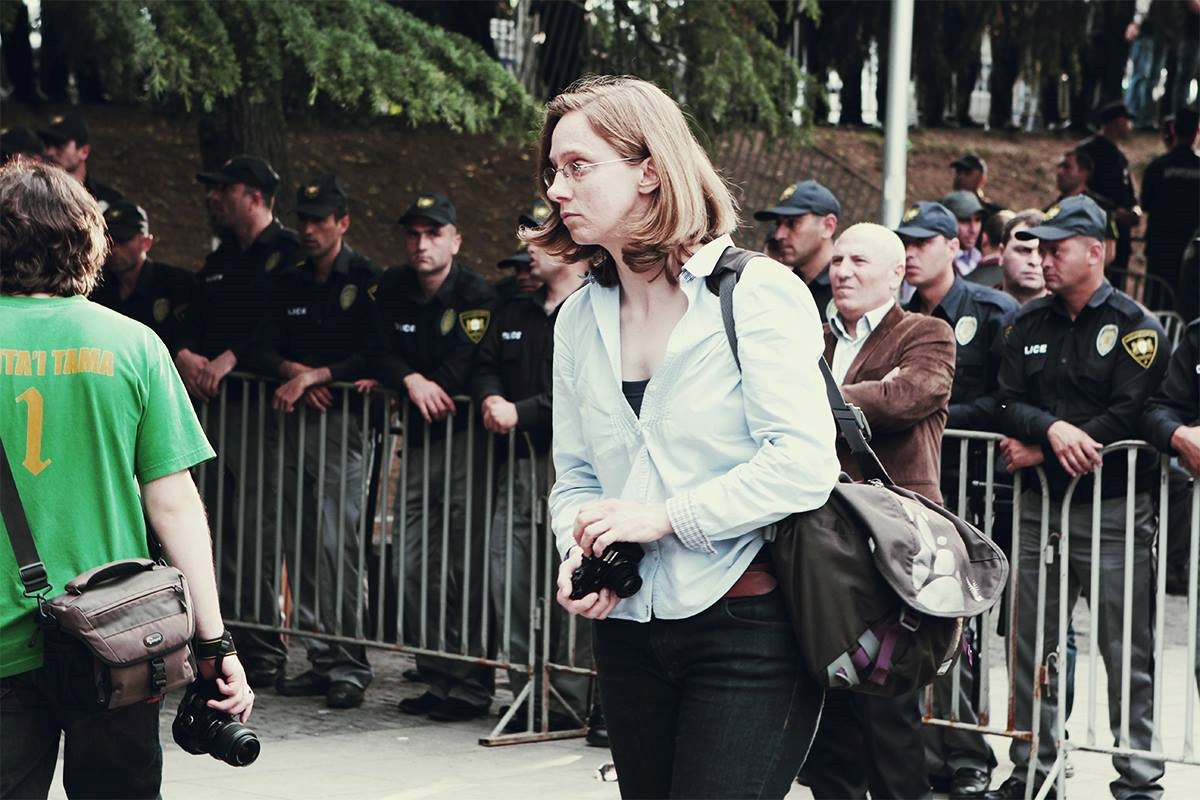
Silvia Stöber
Of course, FactFinder and CORRECTIV are not the only ones making efforts to find facts or verify the news. There is also the Stiftung Neue Verantwortung (SNV), which is an independent think tank that develops concrete ideas as to how German politics can shape technological change in society, the economy and the state. When in Berlin, I reached out to Mr. Alexander Sängerlaub, project director of “Strengthening the Digital Public Sphere | Resilience” at SNV. He shared some time with me during lunch break and we talked about the digital media environment in Germany.
According to Alexander, modern German parties mostly have their own newsrooms. The right-wing parties, as he said, are social media activists and really know how it works.
“Through our research we found very interesting data. I am sure that the left-wing parties are not the ones that spread fake news in Germany. However, I am of a contrary opinion when it comes to the right-wing parties. They know and they use disinformation to make people be more concentrated on fake contents. They easily reach to the older generation, as the new generation is aware of some digital tools. What the generation Z is not good at, in my opinion, is the lack of knowledge to distinguish news from advertisement. It could seem easy to do, but we have this kind of situation now,” Alexander notes.

Alexander Sängerlaub
Alexander Sängerlaub is quite sure that the AfD party has learned a lot from the Austrian colleagues and now tries to make the same locally in Germany. As for the media organizations, which have the highest number of fake news and disinformation, the German expert ensures that sometimes it could be simply done by accident, not on purpose.
“I will bring an example to clarify. There was a case, when the DPA (Deutsche Presse-Agentur) took the records from the Police and made a report. The DPA reporter wasn’t very attentive towards the work he was doing at that time and in the end a wrong storyline was developed with false data. Lots of other media organizations took the information from the DPA and spread it. So did the politicians. It was a small mistake, but the whole storyline was changed and it spread quickly,” my interviewee explained.
And such behavior of journalists is not a new thing for German journalism. It was a real shock in late December of 2018, when German news magazine Der Spiegel was plunged into chaos after revealing that one of its top reporters had falsified stories over several years. The award-winning journalist Claas Relotius had, according to the weekly, “made up stories and invented protagonists” in at least 14 out of 60 articles that appeared in its print and online editions, warning that other outlets could have also been affected. Relotius, 33, resigned after admitting to the scam. He had written for the magazine for seven years and won numerous awards for his investigative journalism, including CNN Journalist of the Year in 2014.
What I learnt when talking to German students is that the generation Z has trust towards the news consumed in Germany, however the lack of media literacy still makes media experts much worried about fake news and disinformation in the country at all levels. What model to develop to help the public with facing fake news? The problem is not yet solved in Germany, although some small steps have already been done. At least, the public broadcaster has a team, which tries to find facts and verify the news before they are published. And this is exactly the experience that can be used in Armenia.
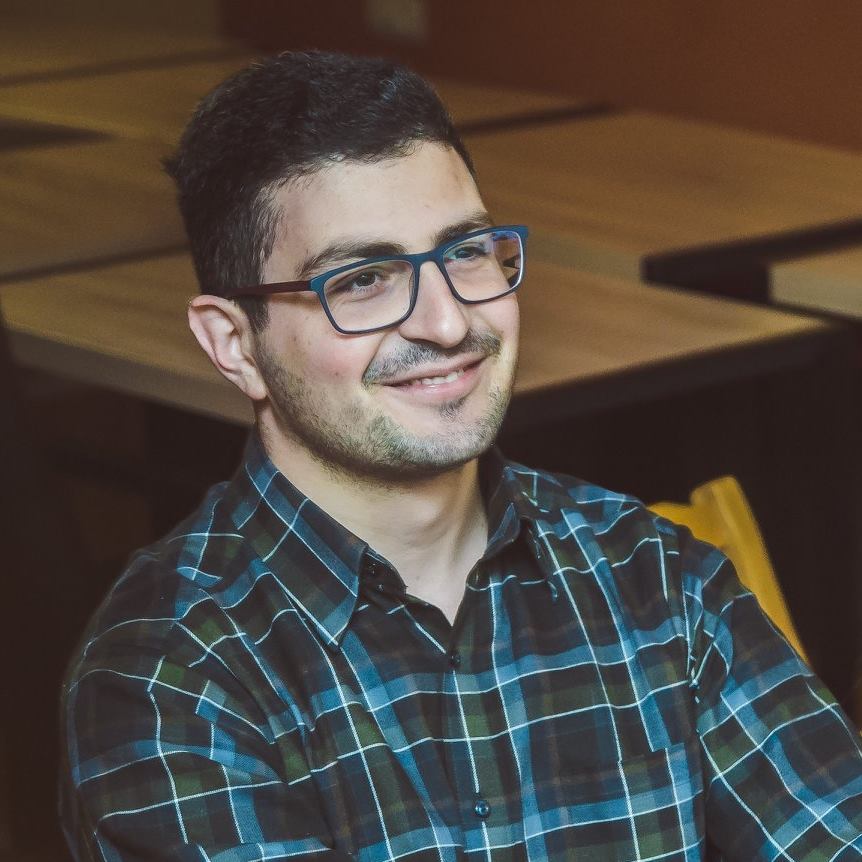 Harutyun Tsatryan is a media researcher, fact-check specialist and lecturer at Yerevan State University. Having Bachelor’s and Master’s degrees in journalism and political science, he got a PhD degree in media studies in 2018. Harutyun has worked as a journalist for several local media companies (Armenpress News Agency, YouthArmenia.am online newspaper, Public TV Company of Armenia, Fact Investigative Platform). Currently he is doing his internship with the European Youth Press and the Washington Post, as well as delivers lectures on media and political technologies, foreign journalism at the Faculty of Journalism of Yerevan State University.
Harutyun Tsatryan is a media researcher, fact-check specialist and lecturer at Yerevan State University. Having Bachelor’s and Master’s degrees in journalism and political science, he got a PhD degree in media studies in 2018. Harutyun has worked as a journalist for several local media companies (Armenpress News Agency, YouthArmenia.am online newspaper, Public TV Company of Armenia, Fact Investigative Platform). Currently he is doing his internship with the European Youth Press and the Washington Post, as well as delivers lectures on media and political technologies, foreign journalism at the Faculty of Journalism of Yerevan State University.
